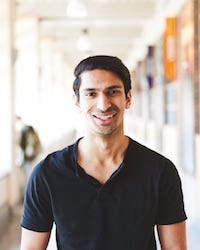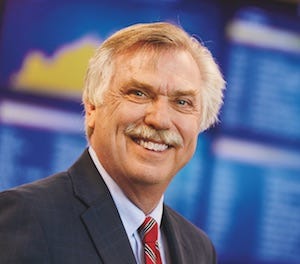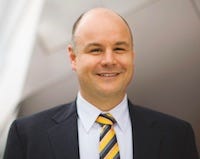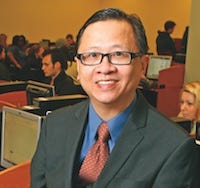To access the full article from the Summer 2018 issue of Marquette's BIZ Magazine follow this link.
Dollars and Sentience
How students and professors are adapting to “quants,” coders and the tidal wave of computer-driven and AI-enabled investing.
By Chris Jenkins
IfMax Mattappillil needed any further proof of the invasion of the world of high finance by “quants” — investment strategists who develop computer code to conduct complex quantitative analysis and support automated trading — he got it when he worked on Wall Street last summer.
During his internship at Societe Generale in Manhattan, Mattappillil noticed something that would have been shocking a decade earlier: Most of the traders he met had computer programming experience and used it in managing their trades. “It’s almost like it’s becoming a requirement,” says Mattappillil, Arts ’18, who majored in applied mathematical economics, a joint program of the College of Business Administration and the Klingler College of Arts and Sciences. “At least on my desk, every trader could program.”
Not that Mattappillil was caught by surprise by this phenomenon. Months earlier, in the spring of 2017, he co-founded Marquette’s Algorithmic Trading Club to bring together students from various majors to experiment with financial applications for computer modeling and artificial intelligence, making him something of a quant himself.
Club members now meet regularly during the school year to compare notes, write code and better understand the nexus of artificial intelligence and algorithmic trading — where traditional fundamental analysis of businesses takes a backseat and humans are mostly removed from buying and selling decisions as computer models developed by quants determine when to execute transactions. At their meetings, students in the club speak almost reverently about Renaissance Technologies, a hedge fund that has set records relying on quantitative analysis developed largely by mathematicians, physicists and other scientists with nonfinancial backgrounds.
As students take the initiative to learn new technologies through the club, faculty leaders in the College of Business Administration have moved past the wondering stage in determining how these rapid changes in the nonfinancial industry will affect the college’s curriculum. “Universities need to get on this quickly because the rate of change is faster than I’ve ever seen it before,” says Dr. David Krause, director of the college’s elite Applied Investment Management or AIM program, where undergraduates get hands-on financial analysis experience, in part by managing their own portfolios from a trading floor inside David A. Straz, Jr., Hall.
“Quants will not take over areas of finance where decisions are based on more than just data that can be run through a model. However, quants will continue to grow at the expense of those who have been involved in the industry pushing paper.”
Toward that end, faculty members from accounting, finance and the AIM program are collaborating to develop a series of stackable modules focused on artificial intelligence, machine learning and blockchain. Drs. Joseph Wall, Grad ’06, assistant professor of accounting, and Terence Ow, associate professor of management, are completing the first modules this summer and seeking funding from an industry partner to support development of secondary modules and expansion to additional topics.
“Each module will develop a special skill set for students, and each will have a deliverable associated with mastery of the material presented,” Wall says. “The first stackable module in each of the current series is designed to be taken with very little baseline knowledge, such that most members of the Marquette community — even those outside of business — could participate.”
While Krause doesn’t see every area of the financial industry surrendering to quants — a human financial analyst is still needed to analyze a company’s future growth strategy, or example — he says any job that deals with past events or is rules-based and can be executed more accurately through an algorithm is up for grabs. “Trading desks are going to go nearly all-quant because they operate 24/7 and can execute trades in nanoseconds when new information becomes available,” Krause says. “Quants will not take over areas of finance where decisions are based on more than just data that can be run through a model. However, quants will continue to grow at the expense of those who have been involved in the industry pushing paper.”
For its part, much of the time, the Algorithmic Trading Club at Marquette seems a better example of harmonious interdisciplinary collaboration than a one-sided rise of the quants. After all, it brings together students from the College of Business Administration, the Opus College of Engineering, the Klingler College of Arts and Sciences and possibly others. “These days you need expertise in a lot of very complicated fields — finance, math and computer science,” says Ryan Schumm, Arts ’18, a data analytics and physics major who served as lead modeler for the club. “The finance part, a lot of that went right over my head, but we have a lot of smart people here who could help me out with that. I could help them out with math and computing, machine learning stuff. It’s been a great learning environment.”
“… if it feels like you’re doing too much manual work, you are. Write a little algorithm to do it for you.”
Look deeper, though, and you’ll see some student members of the Algorithmic Trading Club parting ways over how extensively their field is being transformed. “The classic discretionary strategies really are dying. We know Renaissance Technologies, the top-performing hedge fund in history; they’re just a team of Ph.Ds, mathematicians and physicists. The industry is dominated by machines and math,” says Schumm, representing the bullish-on-algorithms perspective.
Harboring a more balanced view is Mattappillil, who gained hands-on experience not only through internships but also as one of a very few nonfinance majors enrolled in the highly selective AIM program. Returning to New York City this summer for a full-time position at Societe Generale, Mattappillil believes his familiarity with quantitative and fundamental analysis will help him in his career.
“I think fundamental analysis will always have a role,” Mattappillil says. “That being said, everything is going to end up being more quantitative. I can imagine that a trader in a few years will primarily be a computer scientist. ... The number one thing my boss told me last summer is that if it feels like you’re doing too much manual work, you are. Write a little algorithm to do it for you.”
And despite the advance of coders and computers at big-time hedge funds, Mattappillil doesn’t expect to see rank- and- file financial advisers pushed out the door anytime soon. “Maybe generations in the future it can change, but people still want to see a human managing their money,” he says. “It can be uncomfortable if you throw $200,000 into a computer to manage it for you. Even if that’s more accurate, just knowing that someone is handling it can be comforting.”
Learn more about Marquette's Blockchain Lab here.
Learn more about Marquette's Blockchain Lab here.












